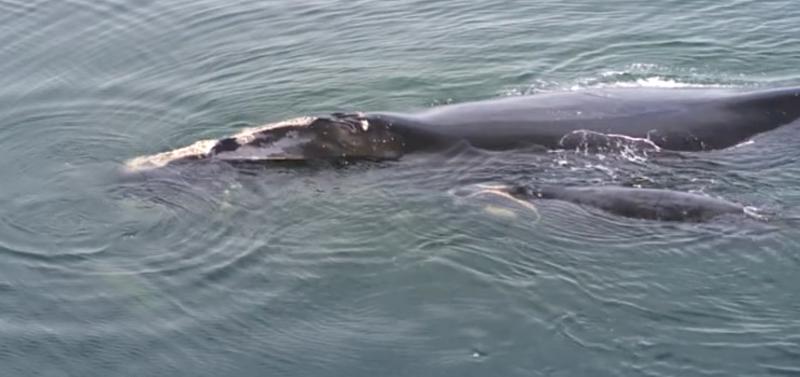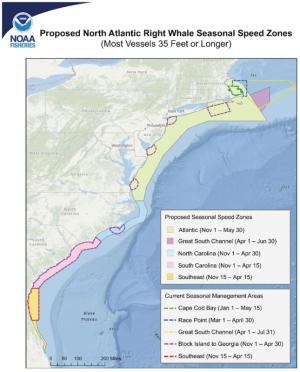Steps proposed to reduce right whale vessel strikes
Looking to further reduce the likelihood of mortalities and serious injuries from vessel strikes, the National Marine Fisheries Service has proposed amendments to the existing North Atlantic right whale vessel speed rule. As proposed, most vessels 35 feet or longer would be required to transit at 10 knots or less within proposed seasonal speed zones.
According to a notice published July 10 by the state’s Delaware Coastal Management Program, the proposed rule would modify the boundaries and timing of seasonal speed restrictions, create a Dynamic Speed Zone program, extend the size threshold of regulated vessels, and update the speed rule’s safety deviation provision.
As part of the public notice, a letter from Shannon Bettridge, NOAA Fisheries Office of Protected Resources’ Marine Mammal and Sea Turtle Conservation Division division chief, to state coastal management program managers is included. Vessel strikes are a leading cause of the species’ decline and a primary factor in an ongoing unusual mortality event, she said, adding that since 2020 alone, there have been at least four documented lethal North Atlantic right whale vessel strikes in U.S. waters involving vessels 35 feet to 65 feet in length.
“Changes are needed to stabilize the ongoing North Atlantic right whale population decline and prevent the species’ extinction,” she said.
Since the existing speed rule does not mitigate risk from lethal collisions involving vessels less than 65 feet, the proposal is to extend the size threshold for regulated vessels to include most vessels greater than or equal to 35 feet in overall length, said Bettridge.
The annual effective dates of the proposed seasonal speed zones are not all the same – the Atlantic Zone, northern North Carolina to northern Massachusetts, would be in place Nov. 1 to May 30; the south channel zone, an area east of the Atlantic zone off Massachusetts, would be in place April 1 to June 30; the North Carolina zone would be in place Nov. 1 to April 30; the South Carolina zone would be in place Nov. 1 to April 15; the southeast zone, Georgia south into Florida, would be in place Nov. 15 to April 15.
The National Marine Fisheries Service expects the largest proportion of costs from implementation of the proposed amendments to be borne by the commercial shipping industry, said Bettridge. However, she continued, other vessel sectors are expected to incur cost burdens, particularly those characterized by higher-speed operations such as passenger vessels, pilot boats, recreational boats, and some commercial fishing and industrial vessels.
Comments concerning this Federal Consistency Determination will be accepted through Tuesday, July 30. Comments may be sent to: Delaware Coastal Programs, Ms. Kimberly Cole, Administrator, 100 W. Water St., Suite 7B, Dover, DE, 19904, or electronically to DNREC_DCP_PublicComment@delaware.gov. For additional information, go to de.gov/dnrecnotices or call 302-739-9283.
Chris Flood has been working for the Cape Gazette since early 2014. He currently covers Rehoboth Beach and Henlopen Acres, but has also covered Dewey Beach and the state government. He covers environmental stories, business stories and random stories on subjects he finds interesting, and he also writes a column called Choppin’ Wood that runs every other week. He’s a graduate of the University of Maine and the Landing School of Boat Building & Design.























































